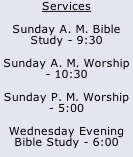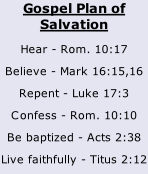








David's throne was established in the city of Jerusalem, 1047 B.C. On it he sat and swayed the scepter of authority over Israel for thirty-
The angel appeared to his mother, and said, "Fear not, Mary; for thou hast found favor with God. And, behold, thou shalt conceive in thy womb, and bring forth a son, and shalt call his name Jesus. He shall be great, and shall be called the Son of the Highest; and the Lord God shall give unto him the throne of his father David; and he shall reign over the house of Jacob forever; and of his kingdom there shall be no end" (Luke 1:30-
Thirty-
I know the Bible says that Christ was declared to be the Son of God, by the resurrection from the dead, etc., but the one specific purpose, the leading thought, the paramount idea, as expressed by the great apostle, was that God raised Christ from the dead to sit on David's throne. May I say to you that, grammatically, "to sit" is all infinitive with the construction of all adverb, carrying the idea of purpose equivalent to the following expanded form, viz.; He raised up Christ that He should sit, that He might sit, for the purpose of sitting upon David's throne. If Christ is not on David's throne, the resurrection might have been deferred until this good hour, or for ages yet to come. If so it be that Christ is not now on David's throne, the Gentiles are yet without God and without hope.
In the great council at Jerusalem, James said, "Simeon hath declared how God at the first did visit the Gentiles, to take out of them a people for his name. And to this agree the words of the prophets: as it is written, after this I will return, and will build again the tabernacle of David, which is fallen down; and I will build again the ruins thereof, and I will set it up: That the residue of men might seek after the Lord, and all the Gentiles, upon whom my name is called." The word "tabernacle" means here lineage, descendants, family. David's family had ceased to occupy the throne since the days of Zedekiah, and David's throne literally had remained in ruins from the days of the captivity. From David's family or lineage not one had swayed the scepter of authority, but when Christ comes, as understood by Peter, as announced and declared by James, and in perfect accord with the prophetic declaration of the generations gone by, Christ was raised up of the family, tabernacle, lineage, descent of David to sit upon his throne.
I verily believe that Christ rose from the dead, that he ascended to the Father, that he was crowned King of Kings and was seated on David's throne which had been transferred to the right hand of God. Hence when Peter came to climax that matchless sermon on Pentecost, he said, "Therefore let all the House of Israel know assuredly, [let them believe confidently] that God hath made that same Jesus whom you crucified, both Lord and Christ."
In Hebrews 8:1 we have these words, "Now of the things which we have spoken this is the sum: We have such all high priest, who is set on the right hand of the throne of the Majesty in the heavens, a minister of the sanctuary, and of the true tabernacle, which the Lord Pitched and not man." In Psalms, 110: 4, there is this: "The Lord hath sworn and will not repent, thou art a priest forever after the order of Melchizedek." Hence Christ began his reign as priest, and likewise as king, at the right hand of God Almighty.
And with these words agrees the sentiment of Paul in that matchless sermon on the resurrection from the dead when he said in I Corinthians, 15:20, "But now is Christ risen from the dead, and become the first fruits of them that slept."
N. B. Hardeman, Adapted from Tabernacle Sermons, Christ On David’s Throne


